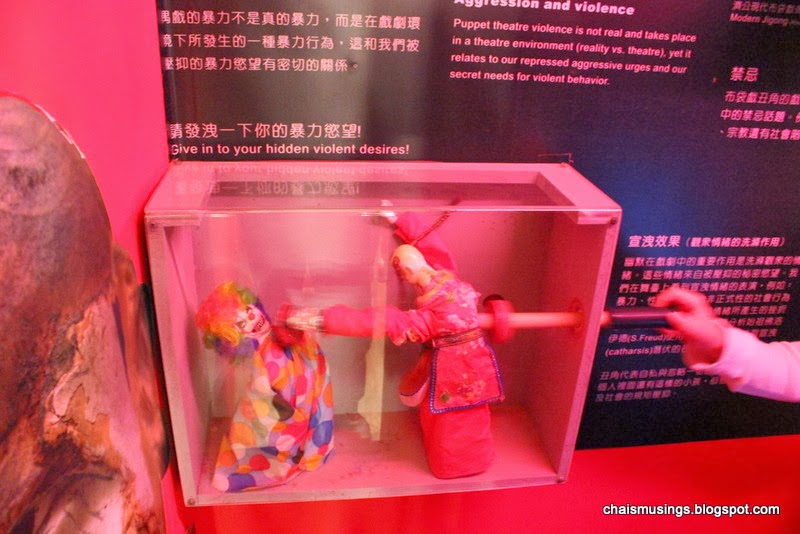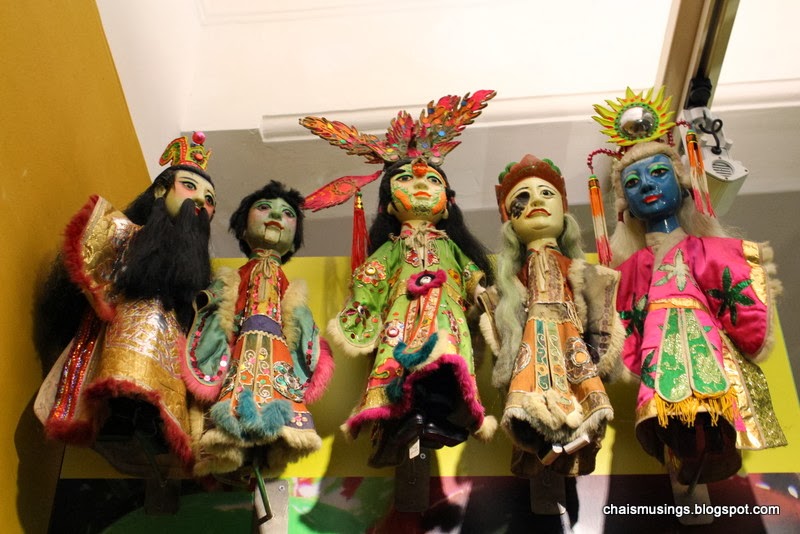Lin Liu-Hsin Puppet Theatre Museum, 林柳新紀念偶戲博物館
I would not have traded the visit to Dr. Paul Lin's Puppet Theatre Museum for any other museums in Taipei. It was a place that houses a unique collection of artefacts (puppets). Some museums that I have visited do hold significant numbers of puppets but the are rarely ever displayed. It also houses a theatre and an educational facilities and a residential performing company that has made tours to many parts of the world. It was a privilege to be able to see with our own eyes Dr. Paul Lin's unique collection of puppets. It is considered to be the finest of its kind in the world.
My children had a chance to manipulate the puppet directly, it was an awesome experience for them. They had fun playing, imagining and enjoyed their day thoroughly. On the very day we were there, a few groups of school students were visiting, they came in buses. (My children were lamenting; how they wished they could do the same at home. At home, in Malaysia, our schools are too academically focused. School trips are rare.)
On the first floor (which we know as ground floor) of the museum, there is a puppet workshop, information desk (manned by a lady), a section for souvenir badges and other souvenirs, and "Nadou Theatre" where various professional performances are held. The second, third and fourth floor display different themes and kinds of puppets from Asian countries, such as shadow play, fantoccini, traditional glove puppetry and Jinkuang puppet show.
Surprisingly, the Adminstrator of the Lin Liu-Hsin Puppet Theatre Museum is Robin Erik Ruizendaal, a Netherlander, he has been living in Taiwan for the last 21 years. Fluent in Mandarin, he has been researching about Chinese Culture for more than 20 years.
Here are some excerpts from his interview with Taipei Times.
"I thought [puppet theater] was a nice window to research Chinese society because it's not upper-class culture, it's grassroots culture," he said.
"At the time China was very closed. We didn't know anything about what was happening in the countryside. I thought it was a really interesting, very localized form of art through which I could observe society, because it's related to religion, social groups, theatre, language, music. It had many elements which interested me."
"The destruction of Chinese religion was high in the priorities of both parties," he said. "I observed China as a religious state where everything is related to religion; everybody lives from house altar to neighborhood altars to temples. What the Communists were doing, as well as the Kuomintang was trying to destroy that element of Chinese culture."
Thanks to Dr. Paul Lin, the Taiwanese government, other benefactors and Robin Erik Ruizendaal, my children had a chance to learn more about the art of Chinese puppetry. The photographs tell our stories!
 |
| Henry David Thoreau said "The world is but a canvas to the imagination." |
Albert Einstein once said that "Imagination is more important than knowledge." and "To stimulate creativity, one must develop the childlike inclination for play and the childlike desire for recognition." If you ever set foot on Dihua Street, do not forget to pop into to this museum. It brings out the child in you!
For more information about this museum, click here. My next post will be about our last day in Taipei.





















































No comments:
Post a Comment